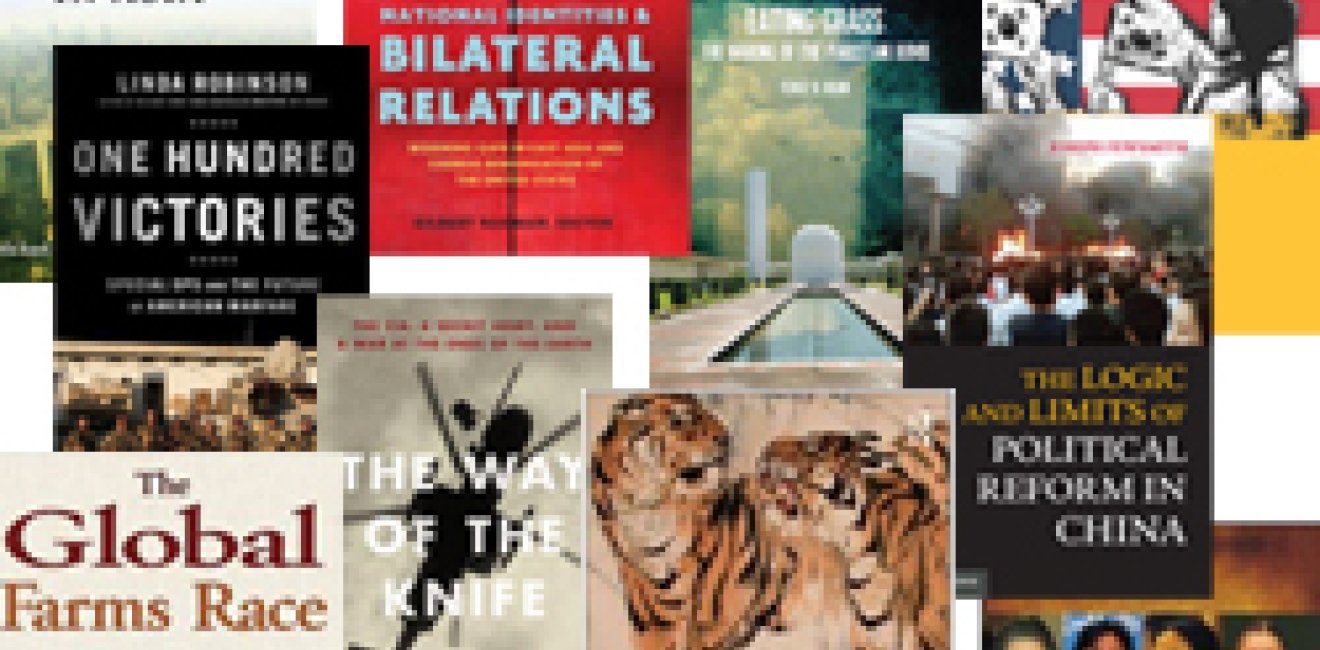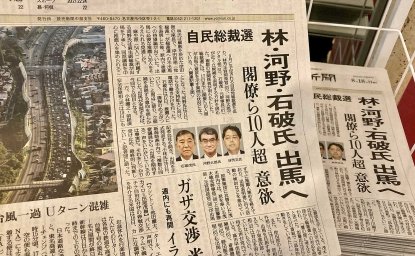Recent Books by Asia Program Scholars and Staff
Asia Program scholars and staff have produced a bumper crop of new books over the past two years. Our ten most recent publications cover the broad expanse of Asia with a wide variety of focuses.
Asia Program scholars and staff have produced a bumper crop of new books over the past two years. Our ten most recent publications cover the broad expanse of Asia with a wide variety of focuses.

Asia Program scholars and staff have produced a bumper crop of new books over the past two years. Our ten most recent publications cover the broad expanse of Asia with a wide variety of focuses. You can learn about how climate change is affecting the security of the region, the changing attitudes towards America among Koreans, and the role of U.S. Special Forces in Afghanistan, among other topics. Please click on the title to purchase any of these books: New Security Challenges in Asia, Michael Wills and Robert Hathaway (editors). Woodrow Wilson Center Press/Johns Hopkins University Press, 2013. New security challenges are increasingly important in U.S. security planning. Transnational threats that do not arise from national rivalries or involve geopolitical competition—climate change, food insecurity, pandemic disease, terrorism, and cybercrime—can destabilize a country just as severely as an invading army. All affect Asia and are particularly problematic for China due to its size, development, and governance. New Security Challenges in Asia focuses on the sources of these challenges, analyzes their international impact, and suggests actions to wrestle them into manageable condition. "A superior work in that it does a superb job in addressing the four major challenges of water security, food security, pandemic diseases, and crime/terrorism." -John J. Brandon, The Asia Foundation
The Global Farms Race: Land Grabs, Agricultural Investment, and the Scramble for Food Security, Michael Kugelman and Susan L. Levenstein. Island Press, 2012.
As we struggle to feed a global population speeding toward 9 billion, we have entered a new phase of the food crisis. Wealthy countries that import much of their food, along with private investors, are racing to buy or lease huge swaths of farmland abroad. The Global Farms Race is the first book to examine this burgeoning trend in all its complexity, considering the implications for investors, host countries, and the world as a whole. "The Global Farms Race is an exceptional book, easily the best on land grabs of any that I have seen." Lester Brown, President, Earth Policy Institute The Logic and Limits of Political Reform in China, Joseph Fewsmith. Chambridge University Press, 2013. In the 1990s China embarked on a series of political reforms intended to increase, however modestly, political participation to reduce the abuse of power by local officials. Although there was initial progress, these reforms have largely stalled and, in many cases, gone backward. If there were sufficient incentives to inaugurate reform, why wasn't there enough momentum to continue and deepen them? This book approaches this question by looking at a number of promising reforms, understanding the incentives of officials at different levels, and the way the Chinese Communist Party operates at the local level. The short answer is that the sort of reforms necessary to make local officials more responsible to the citizens they govern cut too deeply into the organizational structure of the party. “Fewsmith’s superb new book is a warning against optimistic hopes that China will gradually evolve into a democracy...” – Thomas P. Bernstein, Professor Emeritus, Columbia University
Eating Grass: The Making of the Pakistani Bomb, Feroz Hassan Khan. Stanford University Press, 2012. The history of Pakistan's nuclear program is the history of Pakistan. Fascinated with the new nuclear science, the young nation's leaders launched a nuclear energy program in 1956 and consciously interwove nuclear developments into the broader narrative of Pakistani nationalism. Then, impelled first by the 1965 and 1971 India-Pakistan Wars, and more urgently by India's first nuclear weapon test in 1974, Pakistani senior officials tapped into the country's pool of young nuclear scientists and engineers and molded them into a motivated cadre committed to building the 'ultimate weapon.' "Eating Grass will become the authoritative volume on Pakistan's nuclear trajectory, from its uncertain beginnings to Pakistan's present development of tactical nuclear weapons . . . [T]his is the best volume we have."—Shashank Joshi, RUSI Journal
The Way of the Knife: the CIA, A Secret Army, and a War at the Ends of the Earth, Mark Mazzetti. Penguin, 2013. The most momentous change in American warfare over the past decade has taken place away from the battlefields of Afghanistan and Iraq, in the corners of the world where large armies can’t go. The Way of the Knife is the untold story of that shadow war: a campaign that has blurred the lines between soldiers and spies and lowered the bar for waging war across the globe. "The story of how the CIA got back into the killing business is as chilling and dramatic as a spy novel--except it’s true. Mark Mazzetti has laid out an extraordinary tale, tracking the spies as they track the terrorists. The Way of the Knife is as close as you'll ever get to the real thing." -Dexter Filkins, author of The Forever War.
Protesting America: Democracy and the U.S.-Korea Allaince, Katharine H.S. Moon. University of California Press, 2012. When the U.S.-Korea military alliance began to deteriorate in the 2000s, many commentators blamed "anti-Americanism" and nationalism, especially among younger South Koreans. Challenging these assumptions, this book argues that Korean activism around U.S. relations owes more to transformations in domestic politics, including the decentralization of government, the diversification and politics of civil society organizations, and the transnationalization of social movements. "Deeply researched and compellingly argued, Protesting America analyzes the coming of age of a democratic public vigorously making its voice heard on questions of foreign policy. That voice is shaped not by a uniform, psychological anti-Americanism or social Korean nationalism but by a multivocal and vibrant social movement politics..."--Peter J. Katzenstein, Cornell University
National Identities & Bilateral Relations: Widening Gaps in East Asia and Chinese Demonization of the United States, Gibert Rozman (editor). Woodrow Wilson Center Press/Stanford University Press, 2013. Whereas most discussions of history have centered on the rift between China and Japan, this book focuses on three other divisions stemming from deep-seated memories within Northern Asia, which increasingly will test U.S. diplomacy and academic analysis. Presenting three perspectives on each theme, the book launches a multi-sided discussion of the importance of history in international relations. "An excellent contribution to the growing literature on how historical memory shapes the international politics of Northeast Asia. In an era of shifting regional power balances, this volume makes a compelling case for greater U.S. leadership in the process of historical reconciliation." -Mike Mochizuki, George Washington University
Pandora's Daughters, Kalyani Shankar. Bloomsbury India, 2013. Women in India have a long way to go to achieve meaningful empowerment but a beginning has certainly been made. The growth of political parties led by women is a hopeful sign and the fact that the number is only growing is also important. Social changes, increasing access to education and health, growing awareness among women to fight for their due place and, above all, the determination to achieve empowerment, provide a fillip to women’s dreams. Pandora's Daughters analyses the strategies deployed by eight prominent women leaders in modern India to achieve high levels of power in a male dominated world of Indian politics.
One Hundred Victories: Special Ops and the Future of American Warfare, Linda Robinson. Public Affairs, 2013. One Hundred Victories is a portrait of how—after a decade of intensive combat operations—special operations forces have become the go-to force for US military endeavors worldwide. Linda Robinson follows the evolution of special ops in Afghanistan, their longest deployment since Vietnam. She has lived in mud-walled compounds in the mountains and deserts of insurgent-dominated regions, and uses those experiences to show the gritty reality of the challenges the SOF face and the constant danger in which they operate. “Linda Robinson’s ‘One Hundred Victories: Special Ops and the Future of American Warfare’ is a ground-level snapshot of American counterinsurgency in Afghanistan… Robinson, a senior international policy analyst at RAND, gives us a close-up portrait of how these small, highly skilled groups have gone about their mission of helping Afghan villages and local leaders protect themselves from Taliban insurgents. Her treatment is rich and detailed… The book is a worthy addition to the literature on the war.” -New York Times Book Review
Sino-Japanese Relations After the Cold War: Two Tigers Sharing a Mountain, Michael Yahuda. Routledge, 2013. Since the end of the Cold War China and Japan have faced each other as powers of relatively equal strength for the first time in their long history. As the two great powers of East Asia the way they both compete and cooperate with each other and the way they conduct their relations in the new era will play a big part in the evolution of the region as a whole. 'Michael Yahuda’s extraordinary contributions to understanding Asia’s foreign relations reach a new milestone in this clear and comprehensive treatment of the region’s most important relationship. Detached and discerning analysis, adroit use of International Relations theories, and careful weighing of alternatives show a difficult path ahead, short of armed conflict.' – Robert Sutter, George Washington University, US








The Indo-Pacific Program promotes policy debate and intellectual discussions on US interests in the Asia-Pacific as well as political, economic, security, and social issues relating to the world’s most populous and economically dynamic region. Read more



